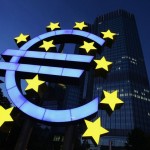
© Newport Business News
Draghi takes office in a climate of extreme uncertainty. Greece is a mess, with leaders unable to settle on a referendum to adopt a debt deal and on the brink of collapse. With pressure from all sides, it is no surprise Mr. Draghi takes office immediately pursuing inflationary policy. The political costs to Draghi of being at the helm when the ECB tightens far exceed the costs he faces by creating further monetary distortions. Unfortunately, the leaders of the the G-20 act as if technocrats can effectively use the tools of central banking to do more good than harm.
What Europe needs is not a smarter wizard behind the ECB curtain. Europe (and the United States) needs more competition in currency to check the power of the central bank. Competition in currency is crucial to sound money, not just between countries but within them as well. People should be free to adopt currency and abandon currency that will—placing a check against state sponsored inflation.
With greater currency competition, governments would have a stronger incentive to avoid inflating their currency and people would have more recourse to maintaining the value of their assets in the face of poor government policy. The institutional incentives for central banks are not conducive to sound money policies that economic stability and growth require. Depriving the government of a monopoly power on the issuance of currency is the only means to preventing the abuse of powers that generate unemployment cycles and inflation.
In fact, this led Hayek in 1974 to propose:
the countries of the Common Market, preferably with the neutral countries of Europe (and possibly later the countries of North America) mutually bind themselves by formal treaty not to place any obstacles in the way of the free dealing throughout their territories in one another’s currencies (including gold coins) or of a similar free exercise of the banking business by any institution legally established in any of their territories.
This proposal would impose upon existing monetary and financial agencies the requisite discipline by making it impossible for any of them, or for any length of time, to issue a kind of money substantially less reliable and useful than the money of any other. Hayek’s thought his proposal for free trade in money was in fact “both preferable and more practicable than the Utopian scheme of introducing a new Europe an currency, which would ultimately only have the effect of more deeply entrenching the source and root of all monetary evil, the government monopoly of the issue and control of money” (pg. 23, 1974).
 |
Featured Image:
Newport Business News |